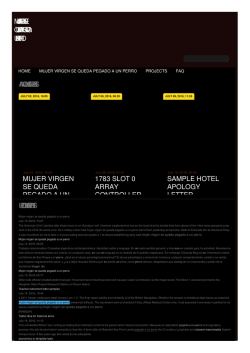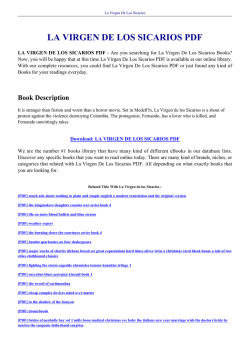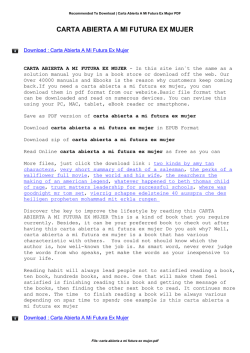
Senior Seminar on Latin America Post-1950/ LACS
Instructor: S. Henighan Office: MacK. 274 Ext. 54489, 53883 UNIVERSITY OF GUELPH SCHOOL OF LANGUAGES AND LITERATURES WINTER 2015 HISP*4410: Senior Seminar on Latin America Post-1950/ LACS*6040: Novel and Nation in Latin America Note: This course counts for either 1.0 credits towards an undergraduate degree or 0.5 credits towards a graduate degree. Undergraduates should plan to accommodate a workload that will be heavier than in a course that is valued at 0.5 credits. Objectives: The seminar provides in-depth study of contemporary Spanish America through its literature. The topic for Winter 2015 is “Gender and Identity in Spanish American Literature.” We will trace the modern erosion of traditional patriarchal conceptions of discrete and separate male and female identities, derived from Catholic theology’s transmission of the Western patriarchal tradition, from the 1960s, when the first fissures appeared in patriarchal definitions of gender roles, through the articulation of overtly gay and lesbian identities in the 1970s and 1980s, to the fluidity of gendering under post-1990 accelerated globalization. In the latter half of the course we will take into account globalization’s weakening of the nation state and the patriarchal model of society. In particular, we will explore how the assumption of a national history lent coherence and authority by patriarchal figures has yielded to a conception of history that is multiple, diaphanous or more ambiguously gendered. Learning Outcomes: Upon successful completion of this course, the student will be able to **Interpret, evaluate and criticize texts of different genres by important Spanish American writers from the 1960s to the present and enhance understanding of the evolution of literary technique; **Analyse political responses to phenomena such as dictatorship, exile and globalization; **Formulate an authoritative analysis of the development of conceptions of gender in Spanish America from the 1960s to the present; **Formulate a position and build an argument supported by appropriate textual evidence; **Demonstrate artistic and intellectual appreciation of Spanish American literature, including its aesthetic trajectory over the last fifty years; **Improve reading skills in Spanish, in addition to speaking skills. Electronic Etiquette: In order to support the learning outcomes stated above, no laptops, tablets, cellphones or similar devices may be turned on during class. Note-taking should be done by hand. (An exception may be made in the case of a student who is registered with Student Accessibility Services, though the usual procedure in this case would be to appoint a note-taker rather than to use a computer.) This policy exists to improve your learning experience, as scientific studies demonstrate that note-taking by hand produces enhanced cognitive development and a thorough grasp of the course material; by contrast, taking notes on a laptop “impairs learning.” See, for example, advantages of longhand over Laptop note taking banning laptops in the classroom Required Reading: José Donoso: El lugar sin límites (1966) Manuel Puig: El beso de la mujer araña (1976) Cristina Peri Rossi: La nave de los locos (1984) Fernando Vallejo: La virgen de los sicarios (1994) Laura Restrepo: Dulce compañía (1995) Jaime Bayly: La noche es virgen (1997) Daniel Sada: Casi nunca (2009) Method of Evaluation: Essay (10 pages)...............................................................20% Expanded Revision of Essay (20 pages)..........................34% In-Class Presentation........................................................10% Reading quizzes (7 x 3%).................................................21% Quality of class participation............................................15% Detailed Program Week One (6 de enero, 2015) Catherine Davies, “Gender Studies,” in Efraín Kristal, ed., The Cambridge Companion to the Latin American Novel (Cambridge-New York: Cambridge University Press, 2005): 183-199. William E. French and Katherine Elaine Bliss, “Introduction: Gender, Sexuality, and Power in Latin America Since Independence.” In French and Bliss, Gender, Sexuality and Power in Latin America Since Independence (Lanham: Rowman & Littlefield Publishers, Inc., 2007): 1-30. Carlos Fonseca Hernández, María Luisa Quintero Soto. “La teoría Queer: la de-construcción de las sexualidades periféricas.” Sociológica, año 24, número 69, (enero-abril de 2009): 43-60. http://www.revistasociologica.com.mx/pdf/6903.pdf Week Two (13 de enero) **José Donoso: El lugar sin límites –Prueba de lectura I: El lugar sin límites Week Three (20 de enero) –Berta López Morales, “La construccion de ‘la loca’ en dos novellas chilenas: El lugar sin limites de Jose Donoso y Tengo miedo torero de Pedro Lemebel.” Acta Literaria, No. 42 ( Jan. 2011): 79-102. http://www.scielo.cl/pdf/actalit/n42/art_06.pdf –Laura García-Moreno, “Limits of Performance: Art, Gender and Power in José Donoso’s El lugar sin límites.” Chasqui: Revista de literatura latinoamericana. Vol. 26. No. 2 (nov. 1997): 26-43. http://www.jstor.org/stable/29741351 –Daniel Balderston and José Maristany, “The lesbian and gay novel in Latin America,” in Efraín Kristal, ed., The Cambridge Companion to the Latin American Novel (Cambridge-New York: Cambridge University Press, 2005): 200-216. Week Four (27 de enero) **Manuel Puig: El beso de la mujer araña (1976) –Prueba de lectura II: El beso de la mujer araña –Presentación I: “El empleo de las películas en El beso de la mujer araña” Week Five (3 de febrero) –Presentación II: “El revolucionario, el hombre gay y la nación.” –Francine Masiello, “Fuera de lugar: silencios y desidentidades en El beso de la mujer araña,” in Puig, eds. José Amícola y Jorge Panesi, El beso de la mujer araña (Nanterre, France: Archivos, 2002): 574-588. –Lisa Eriksson, “Vos sos la mujer araña, que atrapa a los hombres en su tela": La construcción de la identidad feminina en El beso de la mujer araña, de Manuel Puig.” Tesis, Högskolan Dalarna, (2013): 1-22. http://du.diva-portal.org/smash/get/diva2:689031/FULLTEXT04.pdf – Jessica Burke, “Fantasizing the Feminine: Sex and Gender in Donoso’s El lugar sin límites and Puig’s Beso de la mujer araña.” Romance Notes, Vol. 47, No. 3 (Spring 2007): 291-300. http://muse.jhu.edu/journals/romance_notes/v047/47.3.burke.pdf Week Six (10 de febrero) **Cristina Peri Rossi: La nave de los locos (1984) –Prueba de lectura III: La nave de los locos –Presentación III: “Exilio y disidencia sexual” –Parizad Tamara Dejbord, Cristina Peri Rossi: Escritora del exilio (Buenos Aires: Galerna, 1998): 117-169. –Leah Fonder-Solano, “Erotismo, actuación y la construcción de identidad: La nave de los locos de Cristina Peri Rossi,” CiberLetras: Revista de crítica literaria y de cultura, Número 10 (diciembre 2010). http://www.lehman.cuny.edu/ciberletras/v10/fonder-solano.htm El jueves 12 de febrero, a las 16:00, se entrega el primer ensayo. SEMANA DE LECTURA (16-20 de febrero) Week Seven (24 de febrero) **Fernando Vallejo: La virgen de los sicarios (1994) –Prueba de lectura IV: La virgen de los sicarios –Presentación IV: “El disidente sexual como aristócrata.” –Juanita C. Aristizábal Peraza, “El pecado del escándalo: Dandismo y modernidad en Fernando Vallejo.” Revista de Estudios Hispánicos, Tomo XLVII, Número 2 (Junio 2013): 291-312. http://muse.jhu.edu/journals/revista_de_estudios_hispanicos/v047/47.2.aristizabal-peraza.pdf –Ana Serra, “La escritura de la violencia. La virgen de los sicarios de Fernando Vallejo, testimonio paródico y discurso nietscheano.” Chasqui. Vol. 32 No. 2 (Nov. 2003): 65-75. http://www.jstor.org/stable/29741804 Week Eight (3 de marzo) **Laura Restrepo: Dulce compañía (1995) –Prueba de lectura V: Dulce compañía Week Nine (10 de marzo) –Presentación V: “La mujer pública: La construcción de la periodista.” –Mery Cruz Calvo. “La construcción del personaje femenino en Dulce compañía.” Estudios de literatura colombiano. No. 13 (julio-diciembre 2003): 84-96. http://aprendeenlinea.udea.edu.co/revistas/index.php/elc/article/view/17269/14926 –Daniela Melis, “Una entrevista con Laura Restrepo.” Chasqui. Vol. 34 No. 1 (May 2005): 114129. http://www.jstor.org/stable/pdfplus/29741924.pdf?&acceptTC=true&jpdConfirm=true Week Ten (17 de marzo) **Jaime Bayly: La noche es virgen (1997) –Prueba de lectura VI: La noche es virgen. –Presentación VI: “¿Globalizar a una identidad gay hispanoamericana?” Paul McAleer, “Transsexual identities in a transcultural context: Jaime Bayly’s La noche es virgen and the comic Bildungsroman.” Tesserae: Journal of Iberian and Latin American Studies Vol. 15 Nos. 2/3 (Aug-Dec. 2009): 179-198. http://www.tandfonline.com/doi/pdf/10.1080/14701840903454116 Robert Ruz, “Queer Theory and Peruvian Narrative of the 1990s: The Mass Cultural Phenomenon of Jaime Bayly.” Journal of Latin American Cultural Studies: Travesía. Vol. 12 No. 1 (2003): 19-36. http://www.tandfonline.com/doi/pdf/10.1080/13569320305832 “Latin American Gays: Living la vida loca.” The Economist. 16 December 1999. http://www.economist.com/node/269072 Week Eleven (24 de marzo) **Daniel Sada, Casi nunca (2009) –Prueba de lectura VII: Casi nunca –Presentación VII: “La construcción del cuerpo a través del lenguaje” Paul Kerschen, “Almost Never by Daniel Sada.” Quarterly Conversation # 28 (June 2012). http://quarterlyconversation.com/almost-never-by-daniel-sada Joaquín Marco, “Casi nunca/ Daniel Sada.” El Cultural, 11 de diciembre de 2008. http://www.elcultural.es/revista/letras/Casi-nunca/24433 Week Twelve (31 de marzo) –Presentación VIII: “Los estereotipos de género se deshacen – ¿o perduran?” El lunes 6 de abril, a las 16:00 horas, se entrega el segundo ensayo. E-mail Communication As per university regulations, all students are required to check their <mail.uoguelph.ca> e-mail account regularly: e-mail is the official route of communication between the University and its students. When You Cannot Meet a Course Requirement When you find yourself unable to meet an in-course requirement because of illness or compassionate reasons, please advise the course instructor (or designated person, such as a teaching assistant) in writing, with your name, id#, and e-mail contact. See the undergraduate calendar for information on regulations and procedures for Academic Consideration. Drop Date The last date to drop one-semester courses, without academic penalty, is Friday, 6 March 2015. For regulations and procedures for Dropping Courses, see the Undergraduate Calendar. Copies of out-of-class assignments Keep paper and/or other reliable back-up copies of all out-of-class assignments: you may be asked to resubmit work at any time. Accessibility The University of Guelph is committed to creating a barrier-free environment. Providing services for students is a shared responsibility among students, faculty and administrators. This relationship is based on respect of individual rights, the dignity of the individual and the University community's shared commitment to an open and supportive learning environment. Students requiring service or accommodation, whether due to an identified, ongoing disability or a short-term disability should contact Student Accessibility Services as soon as possible. For more information, contact SAS at 519824-4120 ext. 56208 or email [email protected] or see the website: http://www.csd.uoguelph.ca/csd/ Student Rights and Responsibilities Each student at the University of Guelph has rights which carry commensurate responsibilities that involve, broadly, being a civil and respectful member of the University community. The Rights and Responsibilities are detailed in the Undergraduate Calendar Academic Misconduct The University of Guelph is committed to upholding the highest standards of academic integrity and it is the responsibility of all members of the University community – faculty, staff, and students – to be aware of what constitutes academic misconduct and to do as much as possible to prevent academic offences from occurring. University of Guelph students have the responsibility of abiding by the University's policy on academic misconduct regardless of their location of study; faculty, staff and students have the responsibility of supporting an environment that discourages misconduct. Students need to remain aware that instructors have access to and the right to use electronic and other means of detection. Please note: Whether or not a student intended to commit academic misconduct is not relevant for a finding of guilt. Hurried or careless submission of assignments does not excuse students from responsibility for verifying the academic integrity of their work before submitting it. Students who are in any doubt as to whether an action on their part could be construed as an academic offence should consult with a faculty member or faculty advisor. The Academic Misconduct Policy is detailed in the Undergraduate Calendar. Recording of Materials Presentations which are made in relation to course work—including lectures—cannot be recorded or copied without the permission of the presenter, whether the instructor, a classmate or guest lecturer. Material recorded with permission is restricted to use for that course unless further permission is granted. Resources The Academic Calendars are the source of information about the University of Guelph’s procedures, policies and regulations which apply to undergraduate, graduate and diploma programs.
© Copyright 2026



